There have been three different major incarnations of Spider-Man on the big screen. Three different story arcs running over the course of fifteen years, giving audiences three clear opportunities to ruminate on the values intrinsic to Peter Parker as a hero. But what does it mean to be a “Friendly Neighborhood Spider-Man”?
It’s a question that every film incarnation of the webslinger has been desperate to answer. And Spider-Man: Homecoming may have the sweetest, most genuine reply of all.
Peter Parker has had quite the journey on the silver screen in the space of less than two decades. And whatever we can say for the effectiveness of his previous incarnations, there is one thing that filmmakers got irrevocably right through and through over the years: that Spider-Man is one of the only superheroes who has an explicit, unspoken contract with his home. That Spider-Man’s greatest strength lays in the bonds he has with New York City and the strength of his community.
The first two Raimi films exemplified this in the most overt manner of any of the films. In a post 9/11 world, the desire to show New York united against any and all oncoming threats was deeply embedded in the cultural consciousness. This led the first movie to not only reject the scenario of “The Night Gwen Stacey Died” (this time played with Mary Jane instead of Gwen as the damsel in danger), but to pair that fraught moment with even more peril in the form of a dangling cable car full of people. When the Green Goblin tries to make Spider-Man choose between his love and his fellow citizens, New York doesn’t ask the webslinger to stand alone—they come to his aid, throwing rocks at Goblin and sending boats to catch the cable car passengers.
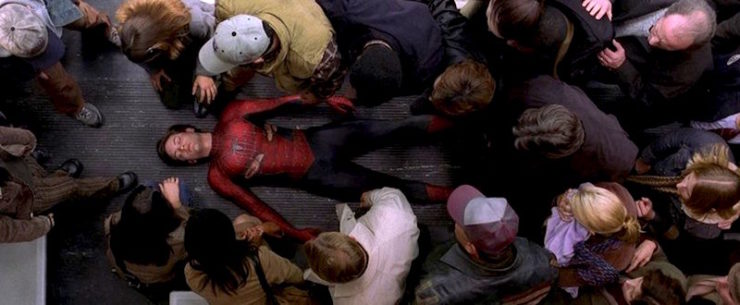
This plays out further in the sequel to the film. When Spider-Man stops a runaway train after his mask has been burned off, the passengers catch him when he collapses and then stand in the way of Doc Oc to protect him. When he wakes, they hand him back his mask and one boy assures him “We won’t tell nobody.” This small sampling of the population have seen Spider-Man’s face, know he’s practically still a boy, and they make the decision to protect him and his identity as if he were family.
The films starring Andrew Garfield don’t let up on this central tenet. In 2012’s The Amazing Spider-Man, the city’s crane operators line up to give him a clear path to Oscorp Tower after one of their own remembers that Spider-Man saved his son when their car was about to fall into the river. That same operator saves Peter when he nearly misses one of his jumps. Captain Stacey chooses to fight alongside Peter despite his suspicions about Spider-Man, once he learns that the kid is the real deal. The sequel continues this motif by showing the way that Spider-Man works with others who are meant to uphold social contracts with the city; he works with the fire department after Electro causes a few infernos, and the police take his lead when Rhino shows up at the end of the film.
Spider-Man: Homecoming offers audiences a variation on this idea. Because we are faced with the first iteration of the character who truly reads like a hapless teenager, Peter’s story is instead about coming to terms with this contract he has with his community, and his choice to make that his calling. While that may sound like small beans, Homecoming is in a better position to make that decision clear than any other Spidey film behind it because it operates in a world where superheroes are already in abundance… making Peter’s decision unique and thus more meaningful.
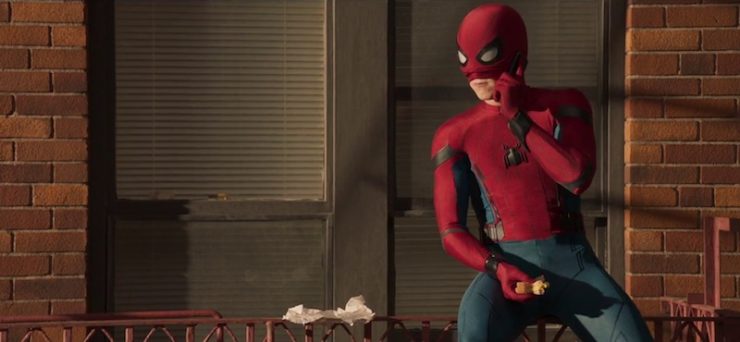
The film begins by showing us that Peter considers himself ready for the big-time after the events of Captain America: Civil War. Following a whirlwind of superheroic action, Spider-Man takes this as a cue that he’s now gone Major League and waits day after day for word from Tony Stark about his next Avengers mission. His early actions as Spider-Man are close to the ground, but largely focused on material concerns—he helps retrieve a stolen bike but has no idea who to return it to, he tries to stop someone from stealing a car that turns out to belong to them. In true Spider-Man fashion, he helps old woman with directions and she buys him a churro for his trouble, a nice callback to Spidey’s humbler roots. He does backflips on command for a guy who owns a food cart on the street.
But Peter doesn’t get a real taste of his true purpose until a crew in Avenger masks decide to knock over a bank with high tech weapons six blocks from his apartment. Excited at the prospect of catching some more serious criminal types, Spidey goes all out—but the the tech proves too much, and one of the robber’s gun slices through Delmar’s Deli across the street. Peter has to abandon the thieves in order to come to the aid of Delmar and his cat Merv, missing out on his chance for glory because saving his friend and neighbor is obviously more important. It’s also relevant that Delmar is the one who calls the cops while Spider-Man is fighting the robbers, thereby reinforcing the concept that Spider-Man can only do his job with the help of others in his community.
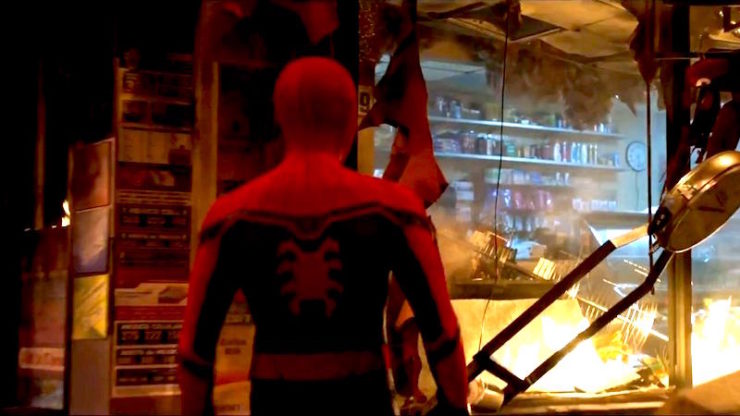
Some of Peter’s encounters with the community are less than ideal, like the number of backyards he has to crash through and roofs he has to damage to catch up with Vulture’s weapons van, and the pair of little girls he terrifies during their camp-out sleepover. As a part of his learning curve he clearly has a long way to go, but his commitment to his friends and neighbors is what ultimately brings him the greatest satisfaction at his job. Spider-Man is praised by Peter’s entire high school after he saves his Decathlon teammates at the Washington Monument, and the local news reports on the incident by showing a snap of Spidey walking out of a port-a-potty with toilet paper stuck to his boot, which reads like a loving tease leveled at their hero. He doesn’t command the awe or reverence that people might reserve for Thor and Iron Man, but that’s because Queens has claimed him as one of their own.
Things start to get serious when Peter encounters more and more of the weapons being produced by Vulture’s crew, and begins an investigation. During his interrogation of Aaron Davis, who was briefly looking to buy weapons, Spidey’s tights and web shooters and “Enhanced Interrogation” voice modulation are mostly useless—instead, Davis cooperates because he remembers that on their first encounter, Spider-Man told Vulture’s crew to aim their guns at him rather than at Davis. He then recalls that Spider-Man helped Delmar following the bank robbery, and they proceed to bond over local sandwich spots. Davis admits that he’s worried about Vulture’s crew distributing more weapons because he has a nephew who lives in the neighborhood (a very likely shoutout to another popular Spider-Man, Miles Morales). Peter gets the information he needs about Vulture’s next meeting because he has made good on his pledge to help out where needed, and because he and Davis have common ground over a desire to keep their home safe.
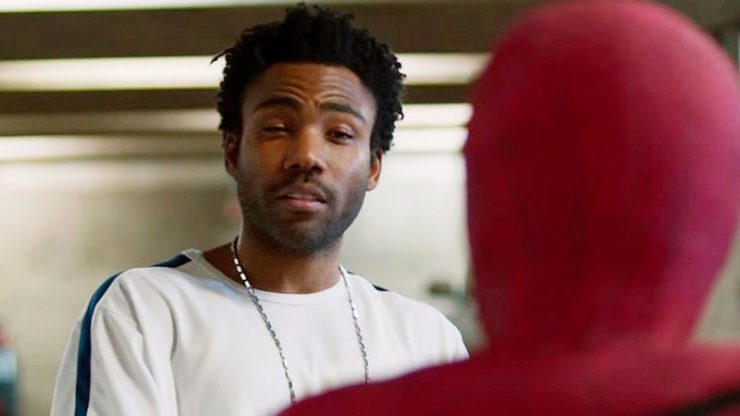
This leads to Peter making his biggest mistake in the film; his choice to head off Vulture’s men during an arms deal on the Staten Island Ferry (against Happy and Tony’s express directives) interferes with the FBI’s sting, which results in the ferry nearly getting destroyed and Iron Man having to swoop in to save the day. Tony tells Peter that he screwed up badly enough that he needs to return the Spider-Man suit, and Peter takes this about as well as you could expect any fifteen-year-old to—it’s the end of the world, as far as he’s concerned. And then something miraculous happens… Peter gets back to his life, to his friends and his neighborhood, to his classes, and he finds that the world is right where he left it. He does well in school, he asks Liz to Homecoming and she says yes, he learns how to dance (badly) and tie a Windsor knot. Because Spider-Man may be the new hero of Queens, but the only reason that’s true is because Peter Parker calls it home.
Bolstered by that renewed sense of belonging, Peter eventually does save the day and stop Vulture. But when the time comes to take his place among the Avengers, he turns Tony Stark down. He decides to be the local street level hero that was pitched to him at the outset. And here is where this version of Spider-Man outstrips the others that came before him; in the previous film iterations, it makes sense for Peter to be a boots-on-the-ground hero because he has nothing to model on, and it makes sense to stay where he’s needed. But a Spider-Man who belongs in the Marvel Cinematic Universe has a different choice to contend with, a shot at skipping his entry-level position and jumping right up to management. He has the chance to take missions of a different “pay grade,” as Tony Stark puts it. He has the chance to jump right into a world of monsters and aliens and magic, and stand alongside the greatest heroes of an era straight out of the gate.
And he says no.
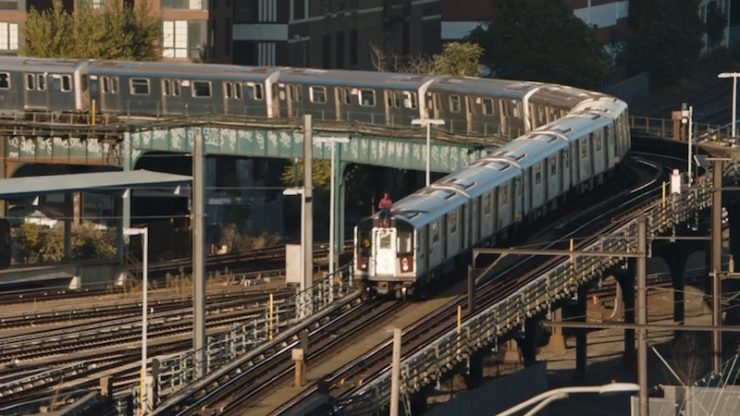
Sure, it’s partly because he’s a fifteen-year-old kid and he finally understands that. But it’s also because he is your Friendly Neighborhood Spider-Man. And in a world rapidly filling up with horrors you can’t comprehend, he wants to make sure that you can hang out on the sidewalks and always get home safe. And if he happens to need a hand one day, well… that’s a small price to pay for having someone super around who cares about your community and the people in it just as much as you do.
This is the advantage of refusing to shorthand his development with Uncle Ben’s death and calling it a day. This is the advantage of examining the idea of communal responsibility through the eyes of a teenager, rather than the jaded, grown-up eyes of someone like Matt Murdock or Luke Cage. Because you see, that title is twofold. Yeah, there’s a Homecoming dance and high school angst and the perpetual terror of figuring out who you are at a point in life when that is the most important thing ever and simultaneously the most impossible thing to get a grip on. But it’s also about Spider-Man’s homecoming. About this universe full of bright, bold super beings and hyper geniuses finally welcoming the sort of heroics that they are incapable of mimicking. Something too eager, too vulnerable, too awkward… and far too close to home.
Emmet Asher-Perrin legit saw Spider-Man on her way home from the theater, fixing his boot and heading back to Queens. It was magical. You can bug her on Twitter and Tumblr, and read more of her work here and elsewhere.










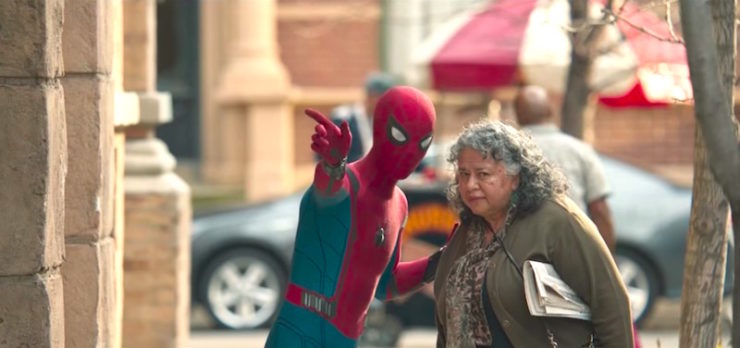
Thank you for that wonderful deconstruction of my favorite movie of the year. Homecoming is definitely the best overall Spider-Man film (I give Spidey 2 the slightest of edges for the train fight sequence) that’s been produced in the last fifteen years, and it’s on par with the best Marvel studios has ever put out. Thank you pointing out how unnessery it would have been to rehash the Uncle Ben tragedy yet again. While it is a huge part of his character, it feels redundant to go over such well trodden ground just on the off chance that there’s somebody who doesn’t know Spider-Man’s origin at this juncture. Great film, great article.
Given that the movie is less than 1 week old, a spoiler warning might be in order.
Aside from that, insightful post. One of the big reasons that Spidey has always been one of the most relate-able superheros is just what you are discussing – his ties to his community and his commitment to its people.
And so he stays in Queens … until Infinity War :)
A great and warm article, even if a bit spoiler-y. They’re not showing S:H here until Friday, but I just bought my ticket an hour ago :) And I know I’m just gonna love it.
Edit: Just saw it, and so I did. A delightful, wonderful movie :)
Part of the neighborhood feel for this story also worked when Peter realizes who the villain is. It could have felt cliched and cheesy. Instead, it made sense. This is a story about living in a community, and the villain is as much a part of it as everyone else.
[spoilers]
Also, kudos for how Keaton’s villain was written. In the opening scene, I wondered if this was a flashback to Uncle Ben. It wasn’t till the very end of that origin story, that I realized, since this was a spider-man movie and since he wasn’t spider-man, the blue-collar guy who was determined not to see his workers lose their jobs and their families go hungry was the bad guy. By the end, even though he had clearly crossed over some big lines, that remained his core. When he threatened Peter, it was under the guise of telling him to treat his daughter well on a date. He was a gray character, someone doing bad things for reasons that were a little too uncomfortably easy to understand.
We just got a chance to rent this movie, and I admit I was skeptical. Did we really need yet another Spider-Man movie? (For the record, I loved the Tobey movies back in the day and while I did really, really enjoy Andrew Garfield/Emma Stone in their roles and thought they had amazing chemistry together, I still kinda felt like Tobey was ‘my’ Spider-Man).
That said, Tom Holland has completely won me over. I think he is the first Spider-Man that really feels like a kid to me – his exuberance and youthful recklessness and awkwardness were just utterly adorable and endearing. While I’m several years removed from high school now, and so high school movies don’t have the same pull on me as they used to, so much of it felt right to me. I was on things like Quiz Bowl and Science Olympiad and so much of it just reminded me exactly of those days (I’m also kind of jealous of their science and technology focused high school…).
I will say, one of my complaints with Civil War was how Spider-Man was pulled into this huge conflict despite being a kid, and having no real vested interest (or knowledge) of what was going on. And in fact, even seeing the beginning ‘movie’ from Spidey’s view – that just hammers it home. He doesn’t know why he’s there, he’s super geeked out about it, but Tony Stark obviously sees nothing wrong with using him when needed, and then more or less ignoring him (or spying on him). Tony himself I think is a very flawed/troubled individual and I think there are a lot of good moments between him and Peter that show he’s at least ‘trying’ to be a good influence and he has a few genuine moments of wisdom (such as the part about needing to be somebody without the suit first) but you can still see that general condescending ‘I know best/this is for your own good’ attitude. (That said, I do think he was completely right to take away the suit, but I don’t think he should have given it to him in the first place. Of course, then we wouldn’t have a movie…).
Throughout the movie I felt so sad for Peter – I just kept wanting to tell him go back to school, enjoy your life as a teen, worry about parties and Quiz Bowl and go swimming. Join your robotics club again. Stop wasting your childhood! It is another mark against Stark’s character, I think, that he was so blithely willing to give him the suit in the first place. And also that – even though he seems to agree with Peter’s decision in the end – he was willing to offer to make him an Avenger (and have him live in the tower?) at all. I mean, it’s almost borderline inappropriate. So I’m really glad the movie went where it did and had him focused on NYC, his community.
I really enjoyed the general thread of the story involving Peter realizing that there are good things about being Peter Parker, it’s not just Spider-Man that matters. I really appreciated that for all the mistakes Peter makes that result in damage, this movie basically avoids the casual loss of life/massive destruction porn prevalent in so many movies. In fact, I really appreciate that Spider-Man himself just doesn’t want to kill at all. He rejects the Instant Kill function, he lets the robbers go so he can save his friend (and the cat!), he doesn’t want to let a criminal get shot, and he makes a point to save the villain at the end. (I also enjoyed what they did with the villain’s blue collar roots and motives – although even though he was completely screwed over and I truly felt sorry for him, I can’t say I agree with making items of mass destruction even more accessible. Although his jab at how Stark made his fortune is food for thought. And really, Tony Stark seems pretty good at creating his own villains given that Vulture’s tipping point is due to something Stark was behind). And this pays off in a way with the stinger where he refuses to give his identity to the other prisoners.
I am usually pretty genre savvy, to the point that I call twists in movies before they happen (especially in the MCU movies). My husband has even commented on this. But I will say that I absolutely did not see coming the fact that he’d end up Liz’s father – it was actually a real delight to be legitimately surprised by the twist.
So many things I could say about this movie. The ‘cameos’ of Captain America were hysterical. “I think he’s a war criminal now, but we have to show you these…” hahaha. The DVD had a bunch of deleted scenes/extras too.
Also, ZENDAYA. This is only funny because a few months ago we were visiting my parents, and they have cable. So, my son was watching a bunch of Disney channel and there was this TV movie on (Zapped) about a girl who gets a Smartphone app that converts human commands into dogwhistle tones that give commands to dogs, but something goes awry and then she finds she can control BOYS! I mean, you can imagine how this movie goes. But the main character is played by Zendaya (somebody I had never heard of) and since my son watched it a ton it ended up kind of an inside joke between me and my husband, so when she just somewhat randomly showed up as this snarky/oddball character (who always seemed to be where Peter was) it was an extra layer of hilarity. And then you find out she’s this universe’s version of MJ, I love it :)